GL Enhances IMS Emulator with Online & Offline Charging System
Welcome to another December 2016 issue of GL Communications' Newsletter providing information and insight into our enhanced MAPS™ IMS Multi-Interface Emulator with support for online and offline charging procedures over Ro and Rf interface.
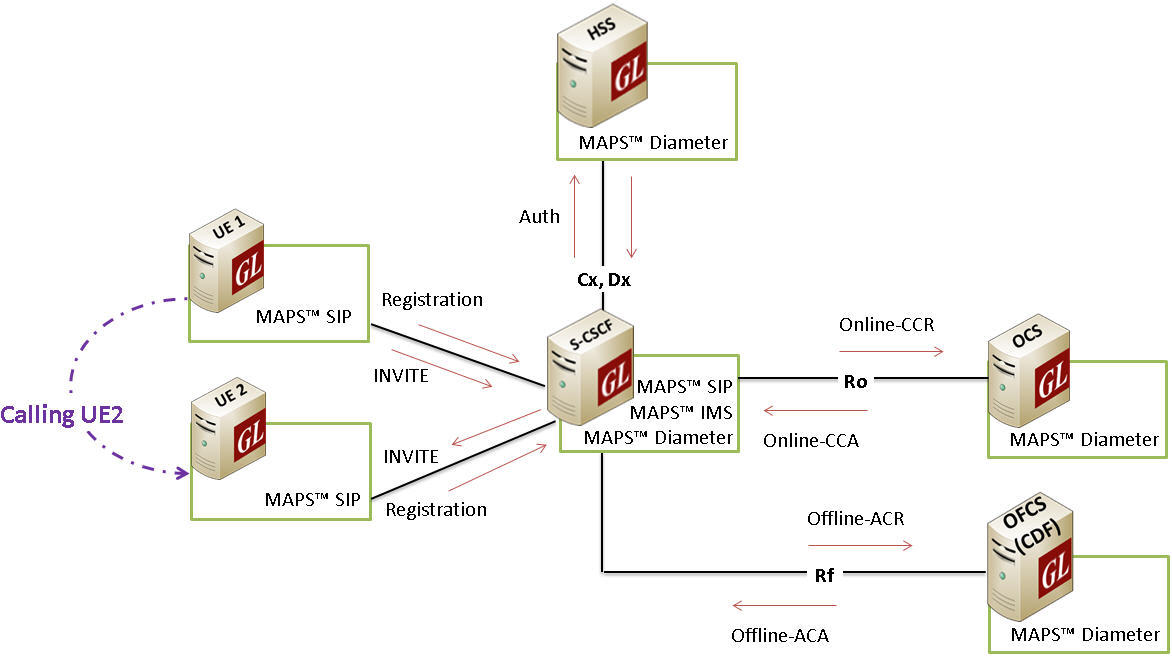
Overview
The IP Multimedia Core Network Subsystem (IMS) is a collection of different functions. IMS uses Session Initiation Protocol (SIP) to access multimedia and voice applications from wireless and wireline terminals creating a form of fixed-mobile convergence. For accounting, authentication, and charging functions, IMS uses Diameter protocol.
Any IMS terminals, using IP or SIP user agents, can access or register directly with the IMS functions. S-CSCF is the central IMS node that acts as a SIP Server for controlling sessions. S-CSCF handles SIP registrations and decides to which application server(s) the SIP message would be forwarded to avail services. It uses Diameter Cx and Dx interfaces to access user profiles in HSS. The S-CSCF also communicates accounting information with the charging functions such OCS and OFCS.
The S-CSCF node in MAPS™ IMS Multi Interface is designed to simulate end-to-end Online and Offline Charging procedures, by simulating S-CSCF node interface towards UEs (SIP), HSS (Cx/Dx), Online Charging System - OCS (Ro), and Offline Charging System - OFCS (Rf) functional entities. MAPS™ S-CSCF multi-interface node interacts with the SIP (UEs) receiving the request and responding using SIP protocol. Registration and Authentication of the UEs is performed at HSS. And MAPS™ S-CSCF interacts with the OCF for processing Online charging procedures and with the OFCS for processing Offline charging procedures.
Functional Description
The charging mechanism is based on IMS network nodes reporting accounting information upon receiving various SIP messages. The CSCF node in IMS network performs the role of a Charging Trigger Function (CTF) entity to issue charging events to an Online Charging System (OCS). The charging events can be immediate (IEC), event-based with unit reserve (ECUR), or session-based with unit reserve (SCUR). This reporting is achieved by sending Diameter Charging Request (CCR) [Initial, Update and Termination Events] and Accounting Requests (ACR) [Start, Stop Event] from the IMS nodes to the Billing System.
During Online charging (pre-paid services) process, S-CSCF acts as a SIP application server controlling the sessions when the user runs out of credits. The Application Server (AS) uses the Diameter Ro interface to forward the charging requests towards an OCF. Session charging with unit reservation (SCUR) is used, where the required numbers of credit units are reserved in the user's account and then service is provided. After the service is over, the number of spent credit units is reported and deducted from the account; the reserved credit units are then cleared.
And during Offline Charging the SIP network entities (P-CSCF, I-CSCF, S-CSCF) use the Diameter Rf interface to send accounting information to a Charging Data Function (CDF). The CDF will collect the information, and build a call detail record (CDR), which is sent to the billing system (BS).
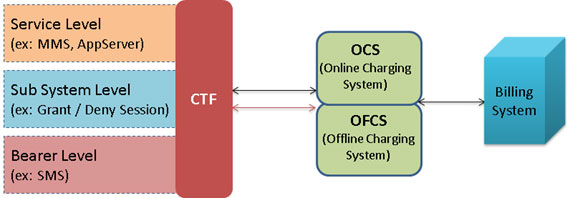
Supported Procedures
Online Session Charging with Unit Reservation (SCUR)
A credit-control process that makes use of several interrogations are: the first (INITIAL_REQUEST), a possible intermediate (UPDATE_REQUEST), and the final (TERMINATION_REQUEST). The first interrogation is used to reserve units from the user’s account and to initiate the process. The intermediate interrogations may be needed to request new quota while the service is being rendered. The final interrogation is used to exit the process.
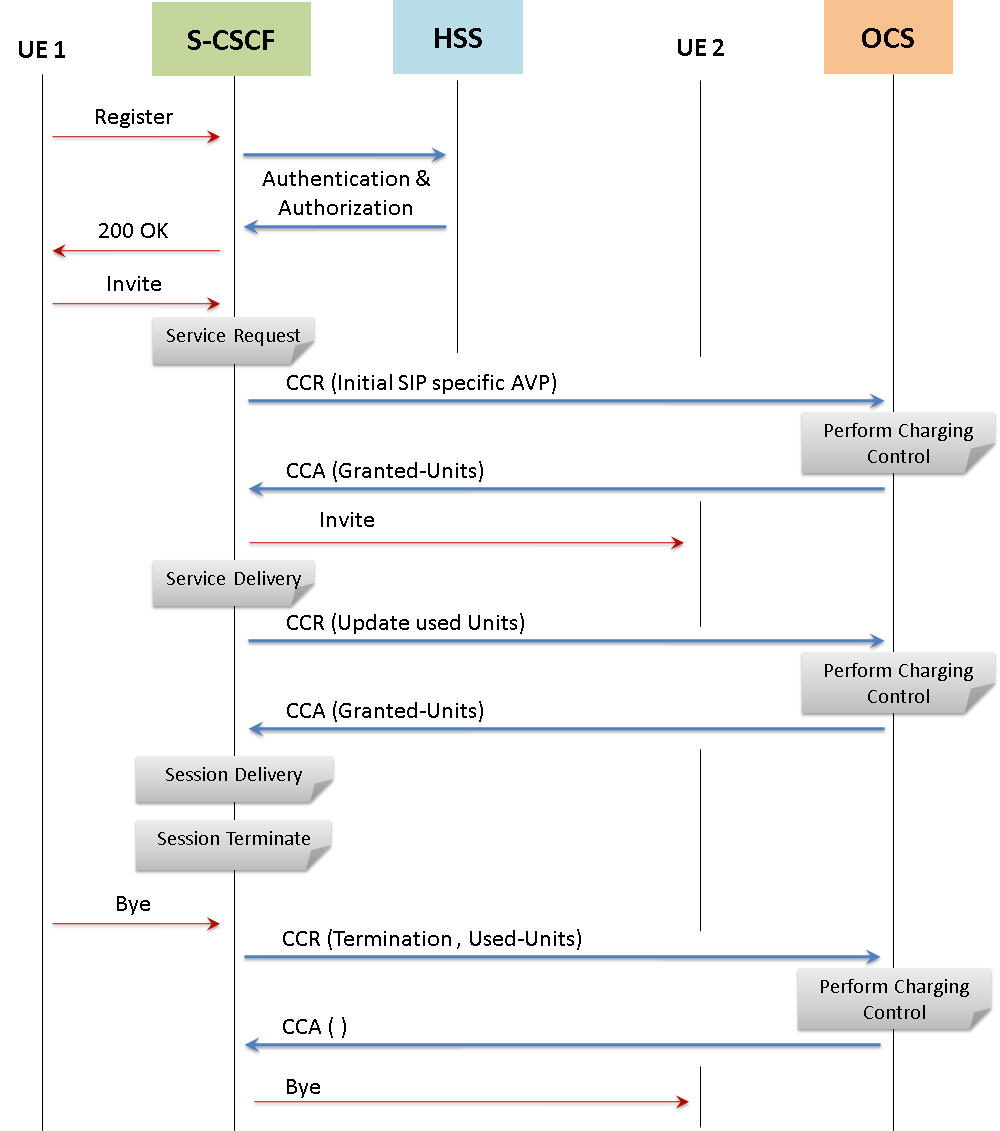
Session based Online Credit Control Procedure
Offline Session Charging
Session based charging is the process of reporting usage reports for a session and uses the START (Initial), and STOP (Terminate) accounting data. During a session, a Network Element may transmit multiple ACR Interims depending on the proceeding of the session.
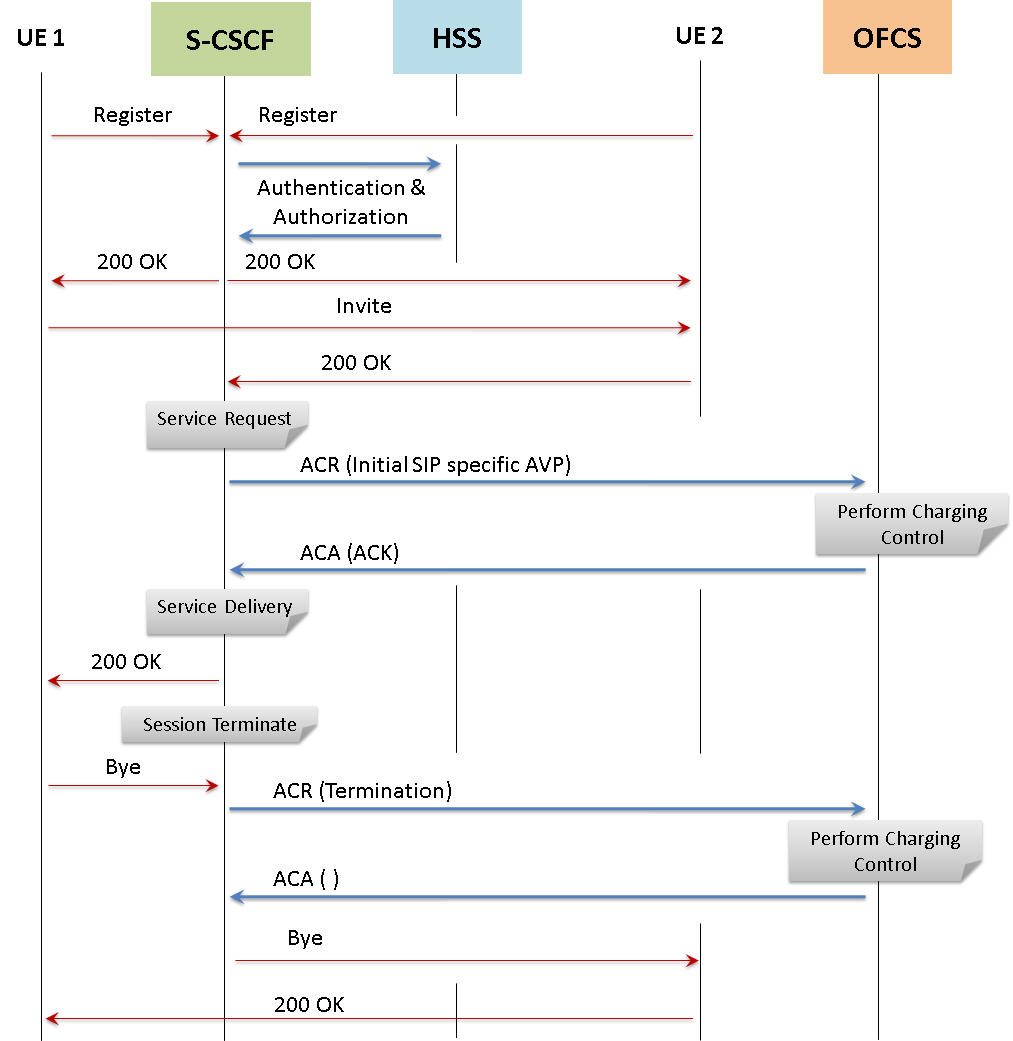
Session based Offline Charging Procedures
The following screen depicts MAPS™ IMS Multi Interface (S-CSCF) receiving the charging request from UE is forwarded to OCS (MAPS™ Diameter) where initial credit request is processed. The initial UE registration and authentication is processed at HSS node (MAPS™ Diameter).
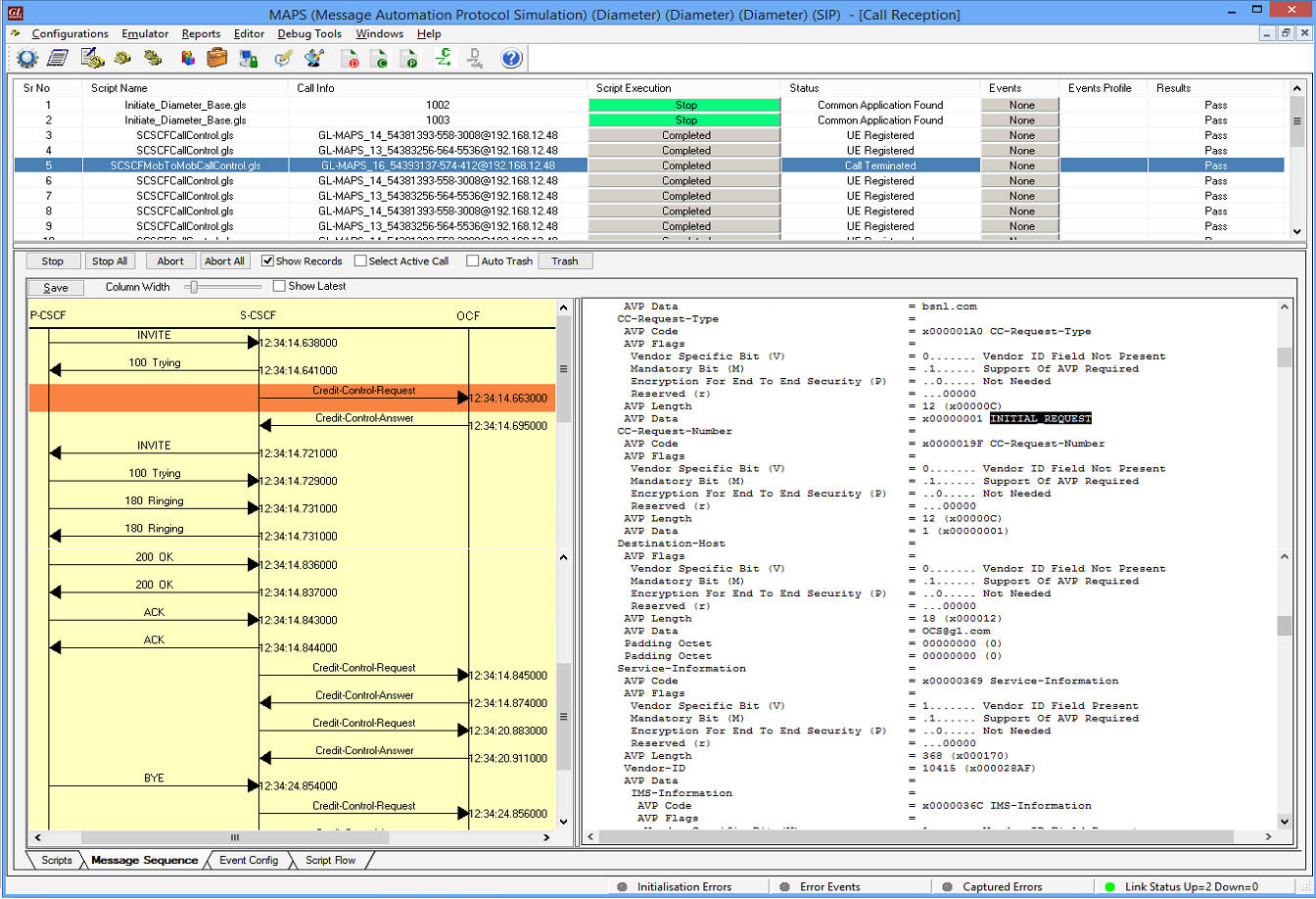
Online Charging Procedure Simulation (S-CSCF)
After successful UE registration and authentication process at HSS node, the call is established between the UEs. The offline charging ACR request is sent from Network Element (SCSCF) to CDF where the credit request is processed. The following screenshot depicts the end-to-end call simulation displayed in MAPS™ IMS Multi Interface (S-CSCF) Call Reception window.
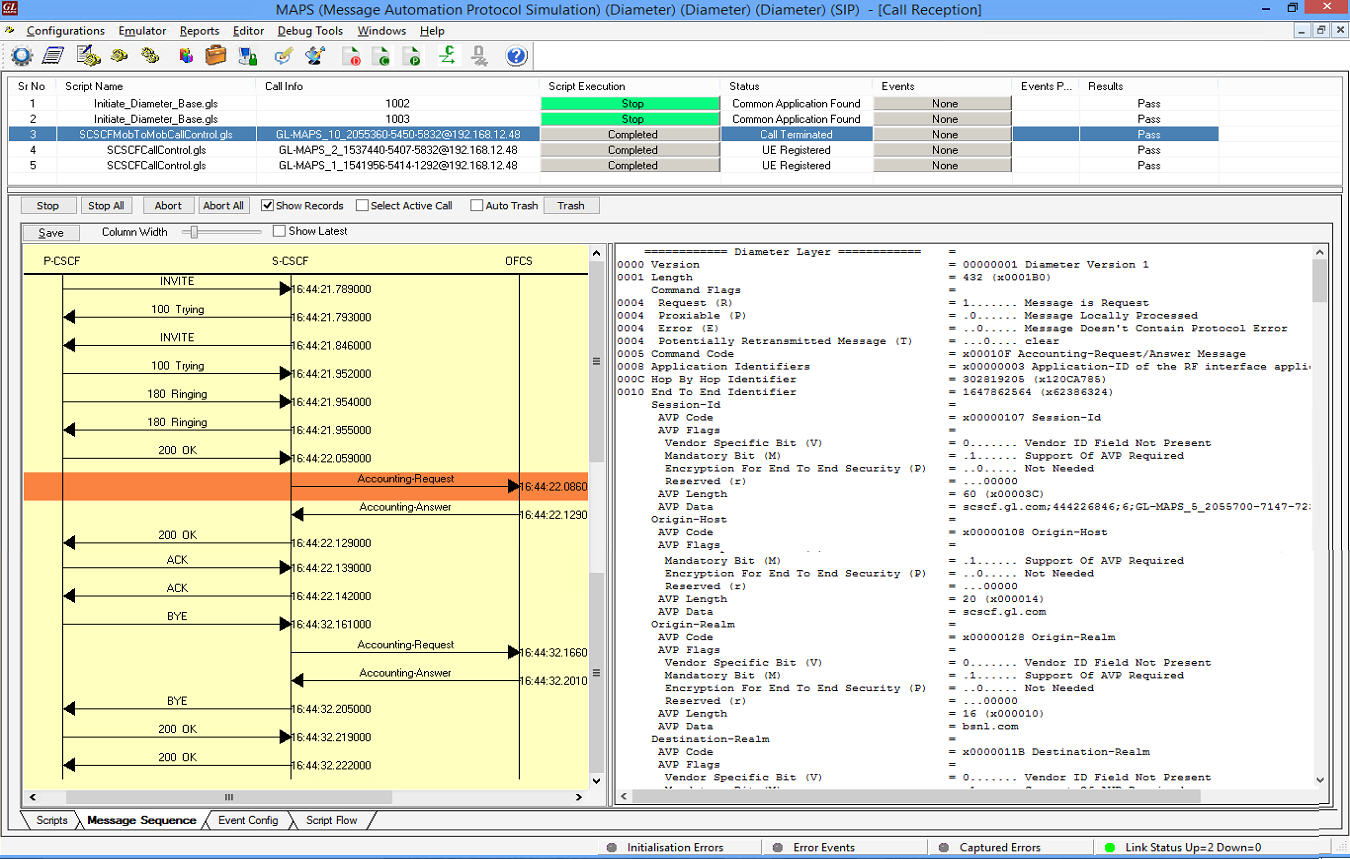
Offline Charging Procedure Simulation (S-CSCF)
Supported Protocol Standards
MAPS™ IMS-Multi-Interface emulator complies with the following protocol standards.
| Supported Protocols | Standard / Specification Used | |
|---|---|---|
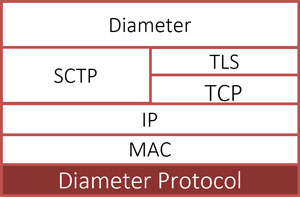 SCTP/TCP/TLS Protocol Stack |
Diameter |
Rx - 3GGP TS 29.214-e10 |
SCTP |
RFC 4960 |
|
Datagram Transport Layer Security (DTLS) |
RFC 6347 |
|
TCP |
RFC 793 |
|
TLS |
RFC 5246 |
|
SIP |
RFC 3261 |
|
SIP Extensions |
RFC 3262 - Reliability of Provisional Responses in the Session Initiation Protocol (SIP) |
 Back to Newsletter Index Page
Back to Newsletter Index Page